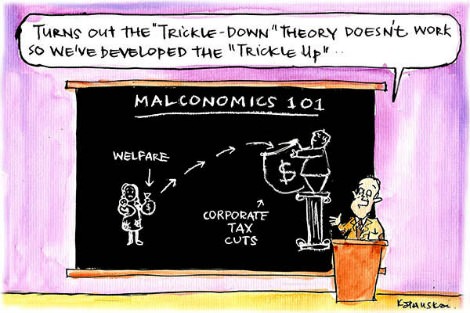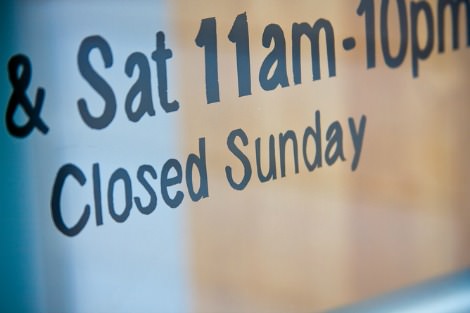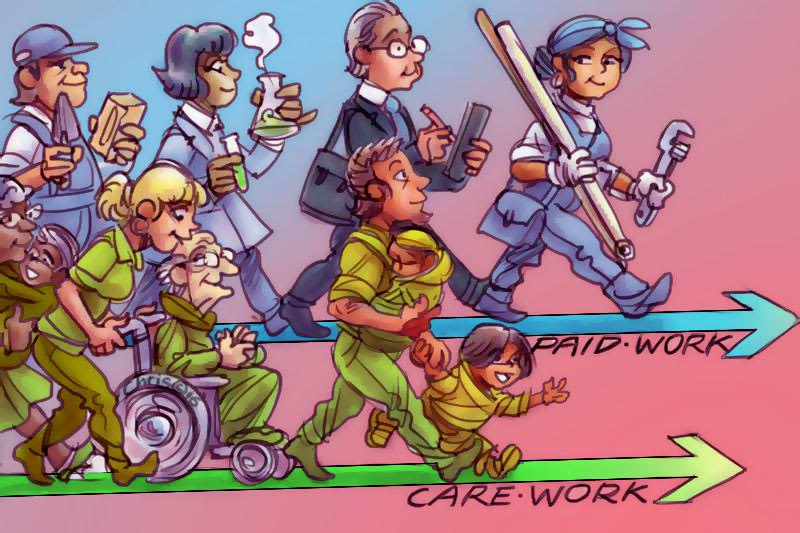Search Results: productivity
-

AUSTRALIA
Next year marks four decades since promulgation of the seminal Declaration of Alma Ata, which declared health to be a fundamental human right and laid the foundations for what are now widely championed as the social determinants of health. Without action on the social determinants, health policy can be a little like that joke about the cyclopean orthopod who, when confronted with a patient suffering fatal internal bleeding, is interested only in fixing their broken leg. So it is with last week's Budget.
READ MORE 
-

ECONOMICS
- Daniel Nicholson
- 24 April 2017
3 Comments
When you are in the business of exploiting people, language matters. A recently leaked document from Deliveroo is geared to emphasising that the people who deliver food for Deliveroo are and should remain independent contractors, not employees. In 2016, a Unions NSW report into the employment practices of gig-economy company AirTasker categorised the online labour market as 'unregulated Taylorism within a Dickensian marketplace where workers compete for bite-sized fragments of labour'.
READ MORE 
-

AUSTRALIA
- Frank Brennan
- 10 April 2017
16 Comments
In an age of 'budget repair', social policy risks becoming just a sidebar to economic policy which is a contest of ideas about how best to grow the size of the pie thereby providing a slice for 'the deserving poor' without having to redistribute too much of the pie, while 'the undeserving poor' drop off the edge as they would have anyway. For those of us schooled in Catholic social teaching, the so-called 'undeserving poor' are the litmus test of our commitment to the human dignity of all persons.
READ MORE 
-

AUSTRALIA
- Sayomi Ariyawansa
- 24 March 2017
5 Comments
In 2015, Four Corners exposed the misuse of migrant labour in Australian horticulture. It found evidence that the labour hire providers routinely underpaid these workers. Once working on-site, some of these workers were required to work excessive hours and endure unsafe conditions. There is great potential for a licensing scheme to bring a degree of regulation. But there are complex reasons behind the prevalence of migrant worker exploitation in the industry, and a licensing scheme is no cure-all.
READ MORE
-

AUSTRALIA
- Kate Galloway
- 20 March 2017
17 Comments
ACTU secretary Sally McManus' comments about the rule of law have sparked a lot of chatter on news and social media. While the rule of law arguably does assume citizens will obey the law, it also assumes government will behave lawfully. Further, it might be argued that the rule of law encompasses the principled application of government power. In this respect, the Australian government is itself falling well below adhering to the rule of law. I offer Centrelink #notmydebt as a case study.
READ MORE 
-

ECONOMICS
- David James
- 07 March 2017
17 Comments
Witnessing the debate over Sunday penalty rates, an intriguing pattern of thinking emerged. It can be characterised as a microcosm/macrocosm duality. Those arguing for lower Sunday wage rates demonstrate their case by talking about individual businesses, the micro approach: 'Many businesses would love to open on a Sunday and if wage rates were lower, they would. Unleash those businesses and greater employment will follow.' Superficially impressive, this does not survive much scrutiny.
READ MORE 
-

AUSTRALIA
- Fatima Measham
- 02 March 2017
13 Comments
The Fair Work Commission decision on penalty rates removes any doubt that young people might have still had about their place in the economic order. The four-yearly review of awards in hospitality, fast food, retail and pharmacy found that Sunday penalty rates 'do not achieve the modern awards objective, as they do not provide a fair and relevant minimum safety net'. But whose safety net? Unfair to whom? These industries are already notorious for exploiting young workers.
READ MORE 
-

AUSTRALIA
- Michael Walker
- 20 February 2017
20 Comments
The presidency of Donald Trump should bring a renewed focus on the dangers of unbridled capitalism. The Catholic Church has a rich trove of teachings on the subject that have been missing in action for the past 30 years. Now is the time for a well-articulated Christian message addressing such issues as widening wealth inequality fuelled by stagnant wage growth, the privatisation of public services, the financialisation of the economy (which fuels both of those trends), and tax justice.
READ MORE 
-

AUSTRALIA
- Kate Galloway
- 25 November 2016
2 Comments
Civil society requires care work. All of us, at various stages of our lives, will be dependent on others for our daily needs. Most of us will likewise care for others at some point. The challenge is how to allocate caring responsibilities throughout society, while allowing also for the paid work that secures economic independence. At the moment the tacit expectation that women will do unpaid care work - and that men (theoretically) are unburdened by care work - contributes to economic inequality.
READ MORE
-

AUSTRALIA
- Kate Galloway
- 06 October 2016
3 Comments
The Productivity Commission was charged in March to inquire into 'data availability and use'. The inquiry holds important implications for Australians because our personal information is collected and stored by business and government in nearly all our daily interactions. The inquiry's terms of reference however make a number of assumptions, making it look very much as though it will find that the benefits of making data available outweigh the costs. And those costs are likely to be our privacy.
READ MORE 
-

EDUCATION
- Peter Hosking
- 19 September 2016
3 Comments
Australia is now planning for an economy that has more elderly people. Death rates are declining and life expectancy is increasing. Our population should reach 36 to 40 million by 2050; the number of Australians aged 65 and over will go from 3.5 million to 9 million. In 1970 we had 29 per cent of the population under 15 and 8 per cent over 65. In 2050 we will have about 17 per cent under 15 and 23 per cent over 65. We need to plan to help the next generation care for the generation above them.
READ MORE 
-

AUSTRALIA
- Roland Manderson
- 12 August 2016
14 Comments
There is a joke about a man looking for a coin under a streetlight: he had dropped it elsewhere, in the dark, but was looking under the streetlight because he could see more clearly there. In the same way, the thinking behind the Productivity Commission inquiry into increasing competition, contestability and informed user choice in human services is fundamentally flawed. The complexity and interconnectedness of human services is too challenging for market economics to properly address.
READ MORE 